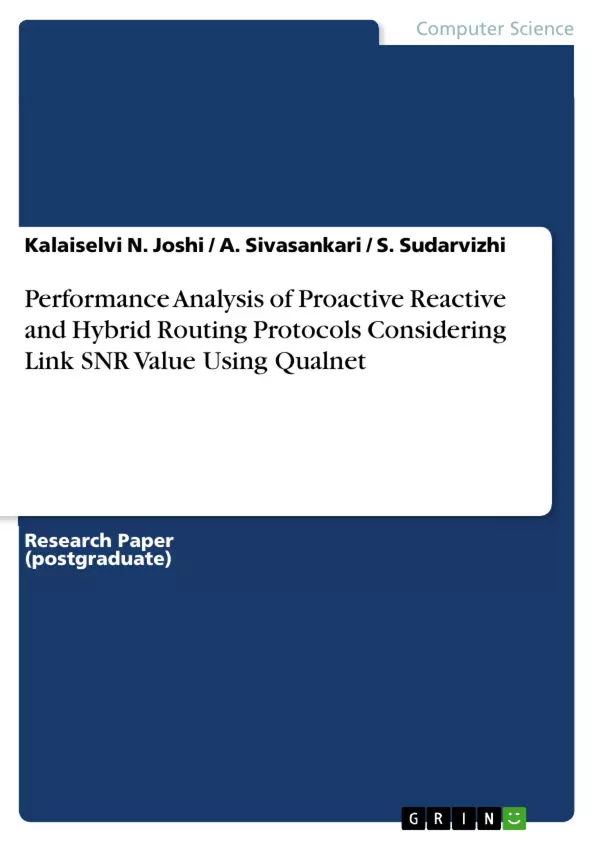Ad-hoc network is a concept in computer communications, which means that users wanting to communicate with each other from a temporary network, without any form of centralized administration. Each node participating in the network acts both as host and router and must therefore be willing to forward packets for other nodes. For this purpose, a routing protocol is needed. Routing protocols in MANET such as OLSR-INRIA, DSR and ZRP finds out the path between a given sources destination node pair without considering the reliability of the links in the selected path. Some links in MANET are unreliable due to interference from transmissions from adjacent links, ambient noise system noise, jamming signals from intruder nodes all of which results in low throughput, packet delivery ratio, high jitter and end-to-end delay. In our work, we use Signal-to-Noise Ratio (SNR) as a measure of the link reliability. We propose modified secure version of the of three protocols namely OLSR-INRIA, DSR & ZRP coined as SOLSR-INRIA , SDSR, & SZRP which takes into account the link SNR value as a measure of link reliability in addition to the other parameters as in the original method in the route discovery phase. QualNet network simulator have been extensively used to evaluate the performance of our modified secure routing protocol over two different network scenarios consisting of 52 and 72 mobile nodes respectively considering random waypoint (RWP) mobility model. The results indicate high throughput, high packet delivery ratio and low jitter and end-to-end delay in comparison to the original protocols which do not account for wireless links reliability.
Table of Contents
- INTRODCUTION
- ROUTING PROTOCOLS
- OLSR-INRIA, DSR AND ZRP
- OLSR-INRIA
- DSR
- SYSTEM ANALYSES
- ROUTING DEPENDABILITY IN AD HOC NETWORKS
- NODE MISBEHAVIOR
- ROUTING DEPENDABILITY PROBLEMS
- ROUTE DISCOVERY PHASE
- SIMULATION SCENARIO AND RESULTS
Objectives and Key Themes
This work aims to improve the performance of routing protocols in mobile ad hoc networks (MANETs) by incorporating Signal-to-Noise Ratio (SNR) as a measure of link reliability. The authors propose modified secure versions of three protocols – OLSR-INRIA, DSR, and ZRP – which consider SNR in the route discovery phase, resulting in enhanced security and throughput. The research utilizes the QualNet network simulator to evaluate the performance of these modified protocols in various network scenarios.- Improving routing protocol performance in MANETs
- Utilizing SNR as a measure of link reliability
- Developing secure versions of existing routing protocols (SOLSR-INRIA, SDSR, SZRP)
- Evaluating performance through simulation using QualNet
- Analyzing network performance metrics (throughput, packet delivery ratio, jitter, end-to-end delay)
Chapter Summaries
- INTRODCUTION: This chapter provides a general introduction to MANETs and their unique characteristics, highlighting the need for routing protocols that adapt to dynamic network changes. Different types of routing protocols are discussed, including table-driven, source-initiated, and hybrid approaches.
- OLSR-INRIA, DSR AND ZRP: This chapter presents a detailed overview of three widely used routing protocols in MANETs: OLSR-INRIA (proactive), DSR (on-demand), and ZRP (hybrid). Each protocol's functionality, advantages, and limitations are explored.
- SYSTEM ANALYSES: This chapter focuses on the challenges of routing dependability in ad hoc networks. It discusses the effects of node misbehavior, including well-behaving, malicious, and selfish nodes, and the impact of such behavior on network performance. The chapter also explores the route discovery and maintenance phases, highlighting the importance of security and availability in MANETs.
Keywords
The work focuses on the performance analysis of proactive, reactive, and hybrid routing protocols in MANETs, specifically considering the link SNR value as a measure of reliability. Key themes include secure routing, network topology, throughput, packet delivery ratio, jitter, end-to-end delay, and the QualNet network simulator. The research proposes modified secure versions of the OLSR-INRIA, DSR, and ZRP protocols, incorporating the SNR value for improved routing efficiency and security.Frequently Asked Questions
What is a MANET in computer communications?
A Mobile Ad-hoc Network (MANET) is a temporary network of mobile nodes that communicate without centralized administration, where each node acts as both host and router.
Why is SNR important for routing in ad-hoc networks?
Signal-to-Noise Ratio (SNR) is used as a measure of link reliability. Considering SNR helps avoid unreliable links caused by interference or noise, leading to higher throughput and lower delay.
Which routing protocols were modified in this study?
The study modified three protocols: OLSR-INRIA (proactive), DSR (reactive), and ZRP (hybrid), resulting in SOLSR-INRIA, SDSR, and SZRP.
What network simulator was used for the performance analysis?
The QualNet network simulator was used to evaluate the protocols across different scenarios with 52 and 72 mobile nodes.
What are the benefits of the proposed "Secure" versions of the protocols?
The modified protocols show improved packet delivery ratios, higher throughput, and significantly reduced jitter and end-to-end delay compared to the original versions.
- Quote paper
- Kalaiselvi N. Joshi (Author), A. Sivasankari (Author), S. Sudarvizhi (Author), 2014, Performance Analysis of Proactive Reactive and Hybrid Routing Protocols Considering Link SNR Value Using Qualnet, Munich, GRIN Verlag, https://www.hausarbeiten.de/document/278251


